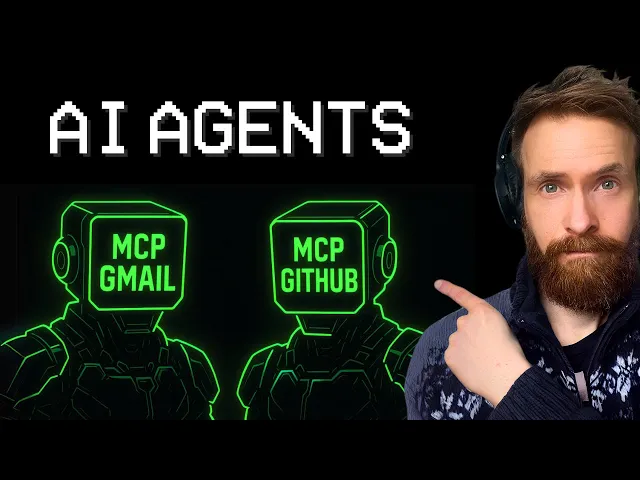Is INSANE Fast Special MCP AI Agents The Future? (I think so)

MCP AI agents: the new speed champions
In a digital landscape where efficiency is king, AI agent systems are evolving at a breakneck pace. A recent demonstration showcases what might be the most impressive implementation yet—a multi-agent system powered by Model Context Protocol (MCP) that completes complex, multi-step tasks in mere minutes, functioning like a well-oiled machine with specialized AI workers.
Key Points
- The system uses specialized AI agents (search, communications, Git) with dedicated MCP servers, allowing each to excel at specific tasks without tool confusion
- An orchestrator agent creates and delegates plans, improving workflow efficiency by routing tasks to the appropriate specialized agent
- The demonstration completed a multi-step workflow (checking Bitcoin prices, creating files, establishing repositories, and sending confirmation emails) in just 80 seconds
- Adding new capabilities is relatively straightforward—as shown when a memory server was integrated, allowing agents to recall and use previously stored information
The Breakthrough You Should Care About
The most impressive aspect of this system isn't just its speed but its architecture. By giving each agent access only to the tools it needs through dedicated MCP servers, this approach solves one of the most frustrating problems with AI agents: tool confusion. When a single agent has too many similar tools, it frequently makes mistakes in tool selection and usage. This specialized approach creates a clean division of labor that mimics human organizational structures.
This matters significantly because it points to how AI will likely transform business operations. Rather than a single large model trying to do everything, we're moving toward systems of specialized AI agents working in concert—each with clear responsibilities. This mirrors how effective human teams operate, with specialists handling their domains of expertise under coordinated leadership.
Beyond the Demo: Practical Applications
Enterprise workflow automation: Imagine a system where specialized AI agents handle different aspects of your business processes—one manages customer communications, another maintains documentation, and a third coordinates with external services. A healthcare system could deploy agents to handle insurance verification, medical record updates, appointment scheduling, and follow-up communications—all orchestrated by a supervising agent that ensures nothing falls through the cracks.
A real-world example already emerging is in software development teams, where specialized AI agents handle code generation, testing, documentation, and deployment processes. Companies like GitHub and Microsoft are exploring such systems to accelerate development cycles while
Recent Videos
How To Earn MONEY With Images (No Bullsh*t)
Smart earnings from your image collection In today's digital economy, passive income streams have become increasingly accessible to creators with various skill sets. A recent YouTube video cuts through the hype to explore legitimate ways photographers, designers, and even casual smartphone users can monetize their image collections. The strategies outlined don't rely on unrealistic promises or complicated schemes—instead, they focus on established marketplaces with proven revenue potential for image creators. Key Points Stock photography platforms like Shutterstock, Adobe Stock, and Getty Images remain viable income sources when you understand their specific requirements and optimize your submissions accordingly. Specialized marketplaces focusing...
Oct 3, 2025New SHAPE SHIFTING AI Robot Is Freaking People Out
Liquid robots will change everything In the quiet labs of Carnegie Mellon University, scientists have created something that feels plucked from science fiction—a magnetic slime robot that can transform between liquid and solid states, slipping through tight spaces before reassembling on the other side. This technology, showcased in a recent YouTube video, represents a significant leap beyond traditional robotics into a realm where machines mimic not just animal movements, but their fundamental physical properties. While the internet might be buzzing with dystopian concerns about "shape-shifting terminators," the reality offers far more promising applications that could revolutionize medicine, rescue operations, and...
Oct 3, 2025How To Do Homeless AI Tiktok Trend (Tiktok Homeless AI Tutorial)
AI homeless trend raises ethical concerns In an era where social media trends evolve faster than we can comprehend them, TikTok's "homeless AI" trend has sparked both creative engagement and serious ethical questions. The trend, which involves using AI to transform ordinary photos into images depicting homelessness, has rapidly gained traction across the platform, with creators eagerly jumping on board to showcase their digital transformations. While the technical process is relatively straightforward, the implications of digitally "becoming homeless" for entertainment deserve careful consideration. The video tutorial provides a step-by-step guide on creating these AI-generated images, explaining how users can transform...
